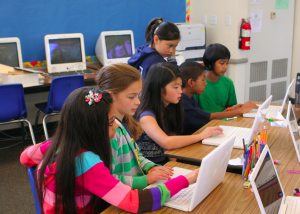By Yalda T. Uhls
With tablets, laptops, apps, and online games, there's great promise in technology to inspire and excite students to learn with digital tools. It's easy to find examples of kids using technology to learn all kinds of things, from learning how to program to using Wii to learn about physics, to learning Latin with an online game. But using technology in and of itself is not a silver bullet for motivating children to love learning and doesn't guarantee they'll use it for creative and innovative scholarship. A student's initiative, self-efficacy and ability to set goals are essential.
Helping kids develop strategies like self-regulation will allow them to use their own initiative and to direct themselves -- without adult supervision. A good self-regulator will pay attention to tasks, persist when it becomes difficult, demonstrate flexibility, and be confident that more effort will lead to positive outcomes. As educators move towards using digital media to teach, and we rely more on children’s independent initiative and motivation, it's important to develop kids' learning strategies so they stay on topic while they use these tools.
So how can parents and teachers help students develop these skills? Teach kids to set an attainable goal -- not one that's out of reach. For example, have them focus on finishing one portion of a 10-page book report rather than the entire project. Second, teach them strategies to help them attain the goal, like setting aside 15- or 30-minute chunks of time on working without
distractions. Finally, work with them to self-reflect on what worked and what didn't in these exercises, and to attribute their successes to their own efforts. Was 15 minutes long enough? Would they benefit from a timer? The goal is to teach the child to self-regulate, not be reliant on adults.


